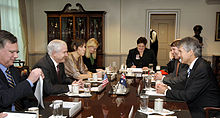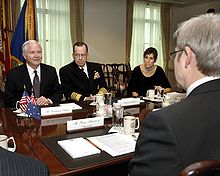- Debra Cagan
-
 Cagan (third from left) at a meeting between Robert Gates and Stephen Smith, Australian Minister for Foreign Affairs
Cagan (third from left) at a meeting between Robert Gates and Stephen Smith, Australian Minister for Foreign Affairs
Debra L. Cagan (born March, 1954) is an American stateswoman and a former U.S. foreign policy liaison. Her most notable public role was that of an adviser to former United States president George W. Bush.
Contents
Career
Government positions
- Senior Counselor for Coalition Affairs. [1]
- Political adviser for SACT and USJFCOM. [2]
- Senior Coordinator for Nuclear and Nonproliferation Policy, Bureau of European and Canadian Affairs, Department of State, United States, 1996.
- Director of Policy and Regional Affairs within the State Department for Russia and the Newly Independent States, 1998. [3][4]
- Office Director, Bureau of European and Eurasian Affairs, the State Department, 2001.
- Political Adviser to Supreme Allied Commander Transformation, 2005.
- Deputy Assistant Secretary of Defense for Coalition and Multinational Operations (to Defense Secretary Robert Gates), 2007. [5]
- State Advisor for the Center for Technology and National Security Policy (CTNSP) [6]
Controversies
Position on Iran
Cagan gained notoriety after the Daily Mail newspaper claimed that during a meeting with visiting British MPs, she stated that "I hate all Iranians." She then purportedly accused Britain of "dismantling" the Anglo-US-led coalition in Iraq by pulling troops out of Basra too soon.[7]
Advocacy
An advocate of increased westernisation in ex-Soviet states, Cagan met Georgian Defence Minister David Kezerashvili on 18 July 2007 to discuss bilateral cooperation. Cagan was one of the first to establish the Georgia Train and Equip Program (GTEP), which has allegedly improved the process of development in Georgia’s professional army. She has also visited and conversed with Albanian[8] and Macedonian[9] officials, on behalf of the United States. Cagan toured Eastern European and central Asian countries seeking increased troop provisions in Iraq, to bolster the image of a coalition.[10]
References
External links
- Debra L Cagan's participation in Project Vinca as recorded in 'Lessons for Securing Civil Nuclear Material Stockpiles'
- Coalition of the Reluctant in the NY Times, October 15, 2005, on coalition building during the Bush Administration
- Letter from Lincoln P. Bloomfield Jr., Assistant Secretary of State for Political Military Affairs 2001-5 in the NY Times, October 19., 2007, on Cagan's service
Categories:- United States Department of State officials
- Anti-Iranian sentiments
- 1954 births
- Living people
Wikimedia Foundation. 2010.

